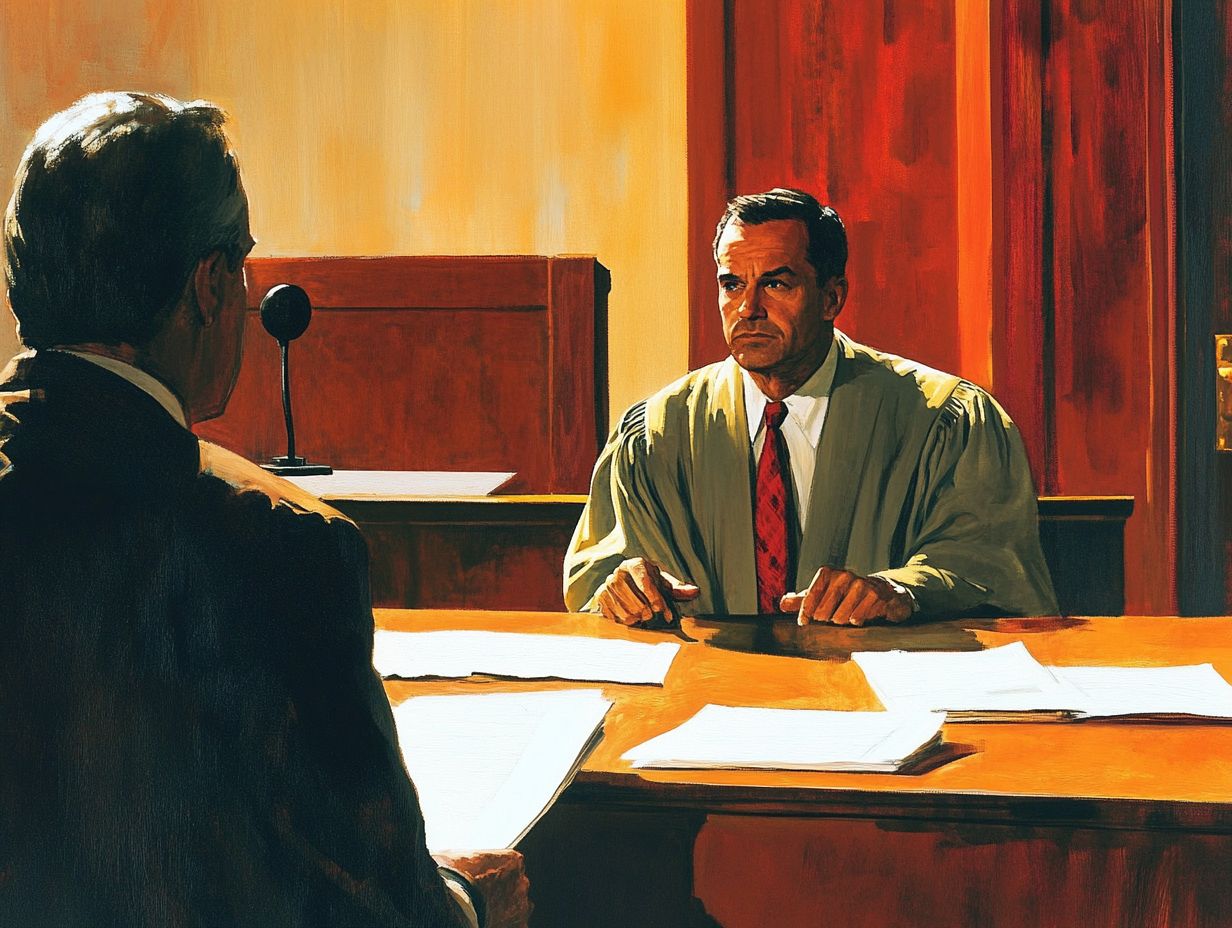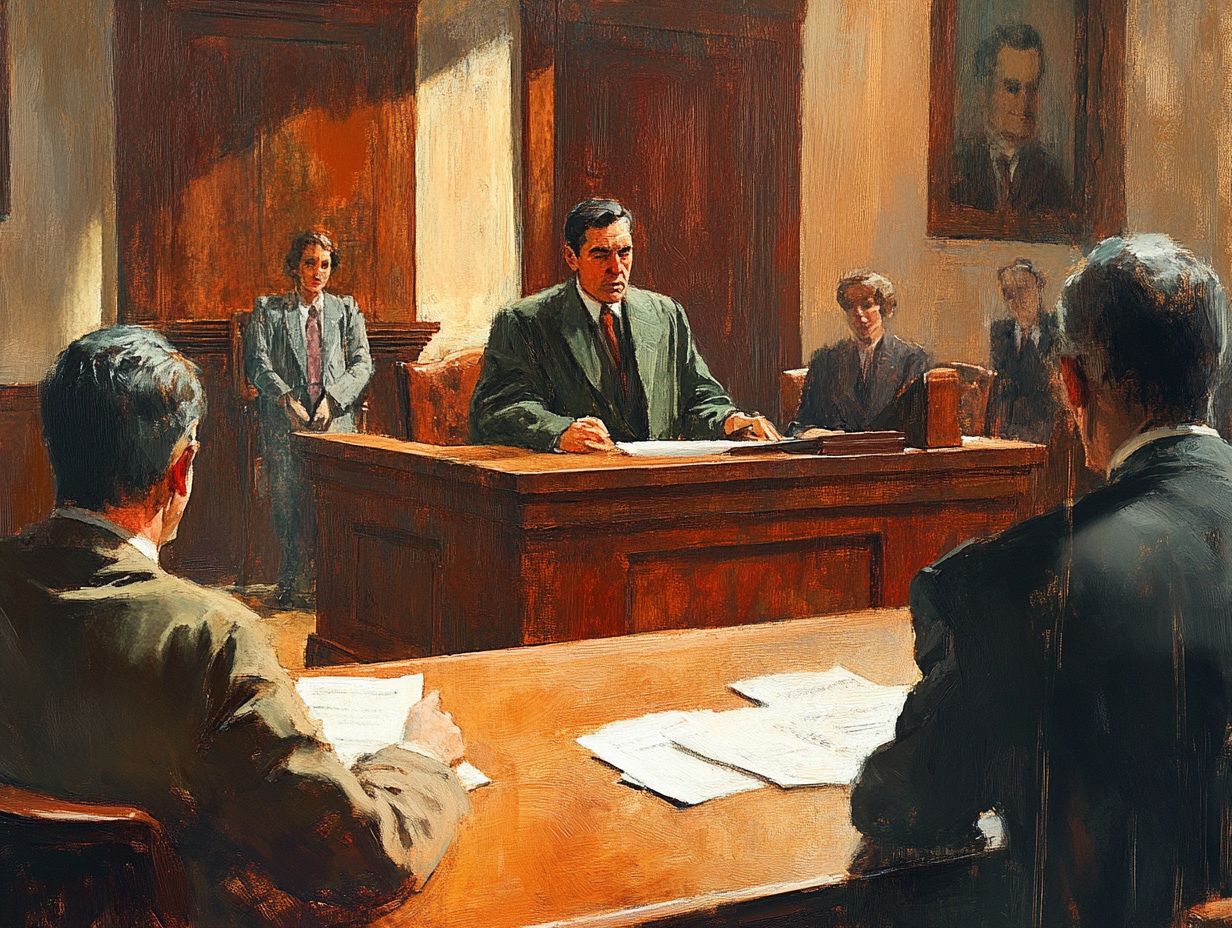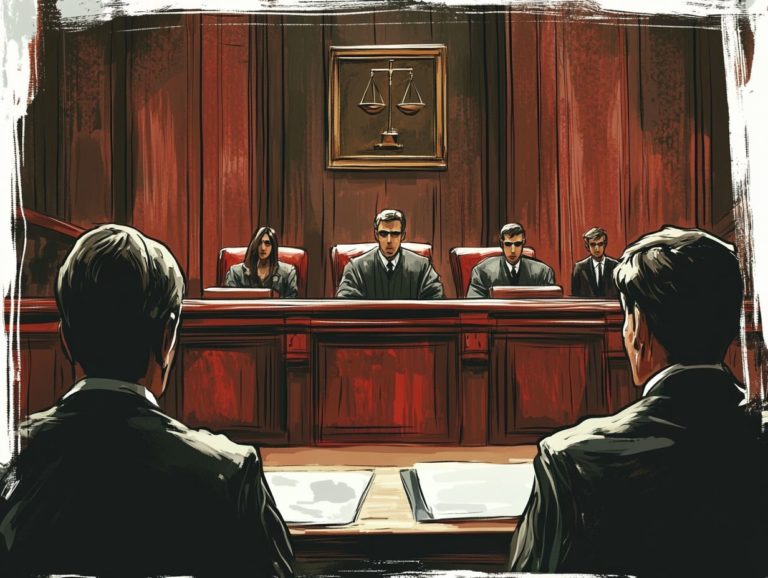Understanding Plea Bargains in Criminal Cases
Plea bargains play a crucial role in criminal justice systems, providing both defendants and prosecutors an avenue to resolve cases without the need for a trial.
This article delves into the different types of plea bargains charge, sentence, and fact bargaining. Let s quickly uncover their pros and cons!
You ll also find a discussion on the negotiation process, highlighting key players like prosecutors and defense attorneys. We will also examine alternatives to plea deals and the factors that influence these negotiations.
Explore with us the intricate dynamics of plea bargaining and its significant impact on the legal landscape.
Contents
Key Takeaways:

Plea bargains are agreements between the prosecution and defense where the defendant agrees to plead guilty in exchange for a reduced sentence or charges.
There are three types of plea bargains: charge bargaining, sentence bargaining, and fact bargaining, each with their own advantages and disadvantages.
The plea bargaining process involves the prosecutor, defense attorney, and judge, with factors like evidence strength and the defendant’s criminal history influencing the outcome.
What is a Plea Bargain?
Have you ever wondered how plea bargains can shape your future? A plea bargain is a legal arrangement between you and the prosecutor, where you agree to plead guilty or no contest to a criminal offense in exchange for a more lenient sentence or even the dropping of charges.
This negotiation lightens the load on the judicial system and allows you to manage your criminal record. It helps you steer clear of the unpredictability that comes with a trial. Such arrangements are standard in criminal justice systems and are typically helped by a lawyer, ensuring your rights are protected.
In essence, plea agreements serve a dual purpose: they provide you with a pathway to a better outcome while also freeing up court resources for more complex cases.
When you consider a guilty plea, it s vital to consult with a lawyer who can expertly navigate the law’s intricacies and advocate for your fair treatment. The expertise of attorneys ensures that the terms of the deal align with your best interests, protecting you from potential coercion and upholding the integrity of the justice process.
Types of Plea Bargains
Plea bargains come in various forms, each offering unique advantages and disadvantages for both the prosecution and the defendant. Understanding these types can provide you with invaluable insights into the plea negotiation process and its potential implications for case outcomes.
Charge Bargaining
Charge bargaining is your pathway to negotiating reduced charges against you. This allows you to plead guilty to lesser offenses instead of facing more serious allegations that could lead to harsher penalties.
Engaging in this type of plea deal can profoundly influence the outcome of your case by softening the blow of a criminal conviction and its accompanying penalties.
In practical terms, charge bargaining unfolds through discussions between your attorney and the prosecution. Both parties will evaluate the evidence, weigh the potential risks of going to trial, and consider your willingness to cooperate or accept responsibility.
This process not only streamlines the legal proceedings but also provides you with potential benefits, such as reduced sentences or lesser charges, while sidestepping the uncertainty of a trial.
However, it s crucial to recognize the risks involved, including the possibility of coercion or underestimating the seriousness of the consequences. Therefore, this negotiation can be vital in shaping your plea process and ultimately impacting your long-term future and legal standing.
Sentence Bargaining
Sentence bargaining is a negotiation tactic where you agree to plead guilty in exchange for a more lenient sentence during a sentencing hearing. This approach can help you avoid the trial penalty that might arise from a guilty verdict. It is designed to secure a favorable outcome while making the court process easier.
Choosing sentence bargaining shows a clear understanding of the legal landscape and the high stakes of criminal trials. Unpredictable jury decisions can lead to harsher penalties, making this strategy crucial.
The implications of this approach go beyond mere leniency; it can also refine your overall legal strategy. This allows you to avoid the emotional and financial burdens that often accompany a trial.
Plea deals can help alleviate court congestion, benefiting not just you but the entire judicial system. Ultimately, utilizing sentence bargaining can ensure you achieve predictable outcomes that work in your favor!
Fact Bargaining
Fact bargaining involves negotiations where the defendant agrees to a plea deal rooted in specific facts about the case. This often leads to an arrangement where the prosecution recommends a lighter sentence or reduced charges in exchange for your guilty plea. It s a crucial process for achieving a favorable outcome in judicial proceedings.
In the realm of fact bargaining, both the defense and prosecution engage in a delicate dance, where the nuances of the case take center stage. The dynamics at play often depend on the prosecutor’s recommendations, which can dramatically influence the nature of the plea agreement.
These recommendations, drawn from the perceived strength of the evidence and surrounding circumstances, provide a compelling incentive for defendants to accept a plea. By highlighting particular facts during negotiations, you can navigate the complexities of the law, striving for resolutions less severe than maximum sentences.
Therefore, fact bargaining transcends mere strategy; it becomes a vital method in the pursuit of justice.
Pros and Cons of Plea Bargains

Plea bargains offer a nuanced landscape of advantages and disadvantages for both defendants and prosecutors. It is crucial for you to carefully consider the pros and cons before deciding on the best course of action.
On one hand, plea deals can streamline case resolutions and reduce the risks of facing harsher penalties that might come with a guilty verdict. On the other hand, they run the risk of leading to unjust outcomes, particularly in cases that intersect with issues of marginalization or racial bias.
Advantages of Plea Bargains
One of the primary advantages of plea bargains is your ability to negotiate reduced charges, potentially leading to lighter sentencing recommendations. This helps you avoid the uncertainty that comes with a trial.
By accepting a plea deal, you might achieve a guilty admission that results in lesser penalties, safeguarding your criminal record and future opportunities.
Opting for a plea deal allows you to save not only your sanity but also precious time by avoiding lengthy court procedures that can drain both your financial resources and emotional energy.
Engaging in plea negotiations creates a more favorable environment for you, opening the door to collaborative efforts with prosecutors. This approach often leads to alternatives to imprisonment, such as probation or community service, easing your reintegration into society.
Ultimately, leveraging plea bargains strategically can greatly enhance your prospects, unlocking opportunities for future employment and lightening the burden of a criminal past.
For more personalized advice, consider consulting with a legal professional to explore your options further.
Disadvantages of Plea Bargains
Despite their advantages, plea bargains have significant drawbacks. Being aware of these risks is crucial. There s a chance of unjust outcomes, such as wrongful convictions, or feeling pressured to accept a guilty plea when maintaining your innocence might be a better option.
You might face uncertainty about the outcome, especially when trial alternatives could lead to very different results. This discomfort often stems from factors such as the stress of navigating the legal system and the possibility of inadequate access to competent legal representation.
Many individuals feel pressured into accepting a plea deal. They fear the consequences of going to trial could be far worse, even if acquittal is an option. The lack of transparency in the agreement process can leave defendants confused about the implications of their choices, raising legitimate concerns about fairness.
As a result, the pursuit of justice can be overshadowed by the practical need to resolve criminal charges efficiently.
The Process of Negotiating a Plea Bargain
Negotiating a plea bargain involves several key players: the prosecutor, your defense attorney, and sometimes the judge. They work together to forge an agreement that satisfies both parties while gaining judicial approval.
This negotiation process is vital for your future! It shapes the ultimate outcome of your case and can profoundly influence your rights and options moving forward.
Roles of the Prosecutor, Defense Attorney, and Judge
In the plea bargaining process, the prosecutor plays a pivotal role. They propose terms while weighing the strength of the evidence and making recommendations. On the other side, the defense attorney safeguards your rights and negotiates on your behalf.
Ultimately, the judge holds the authority to approve or reject the plea agreement. This highlights the importance of legal representation during this stage of judicial proceedings.
The interactions among these parties create a dynamic environment. The prosecutor evaluates the merits of the case and potential risks while striving for a conviction and balancing justice with public safety. Meanwhile, the defense attorney meticulously analyzes the evidence, devising strategies for the best possible outcome for you.
This negotiation isn t just a simple exchange; it requires skillful communication and a deep understanding of legal nuances. Both sides aim to reach a resolution that benefits everyone involved.
Finally, the judge ensures the agreement aligns with legal standards and principles of justice, shaping the final outcome of your plea deal.
Factors that Influence Plea Bargaining
Numerous factors shape the plea bargaining process. These include the strength of evidence against you, your criminal history, and, in certain situations, the wishes of the victim.
Each element can significantly influence negotiations and ultimately determine the outcome of your case. Therefore, analyzing these influences thoroughly is crucial for navigating the process effectively.
Strength of Evidence

The strength of evidence is a crucial element in plea bargaining. It significantly influences both the prosecutor’s willingness to negotiate and your decision to accept a plea deal. When the evidence against you is strong, your options may be severely limited. Conversely, weak evidence can lead to negotiations that might result in more favorable outcomes.
In this complex process, the nature and quality of the evidence often dictate the negotiation dynamics. When prosecutors are confident in their evidence, they tend to adopt a more aggressive approach, believing that securing a conviction in court is very likely. This can put substantial pressure on you to accept a plea, even if the terms aren’t ideal.
On the flip side, when the evidence is ambiguous or weak, it creates a valuable opportunity for you to advocate for a better deal.
Ultimately, the strength of the evidence impacts your strategy and plays a pivotal role in determining the overall outcome of the case. This underscores its importance in the landscape of plea bargaining.
Criminal History of the Defendant
A defendant’s criminal history can profoundly influence the plea bargaining process. Previous convictions can shape the prosecutors’ negotiating stance and the potential consequences you might face.
Understanding the role that criminal history plays in plea negotiations is essential for protecting your rights. This historical backdrop can lead to harsher sentencing recommendations. Being aware of how your past may impact current negotiations is crucial.
Prosecutors often interpret a lengthy criminal record as a sign of re-offending, which can lead them to push for stricter penalties and reduce your chances of landing a favorable deal.
If your record is clear of serious charges, you might have some leverage, opening doors to more agreeable terms.
Ultimately, grasping the nuances of this dynamic enables you to make informed decisions about whether to accept a plea offer or pursue trial options, all while ensuring your legal rights are safeguarded.
Victim’s Wishes
The victim’s wishes can significantly influence the plea bargaining process. Acknowledging and respecting the victim’s perspective can impact case outcomes and the judicial endorsement of plea deals.
When considering these wishes, it s crucial to weigh emotional and psychological factors alongside the legal implications that may arise from the victim s input.
Engaging the victim in the discussion can lead to more satisfying resolutions for everyone. This could also include the potential for restorative justice outcomes.
Understanding what the victim desires whether it s closure, restitution, or involvement in the legal process can shift the dynamics of your discussions and redefine the legal framework surrounding plea agreements.
Alternatives to Plea Bargains
While plea bargains are common in the criminal justice system, several alternatives are available:
- Going to Trial: This presents a significant alternative to accepting a plea bargain, allowing you to contest the charges against you in court.
- Diversion Programs: These provide an opportunity to sidestep formal criminal charges by completing specific rehabilitation or educational requirements.
By exploring these trial options, you can gain a clearer understanding of the potential risks associated with plea bargains and the opportunities that may lead to a more favorable outcome.
Going to Trial
Going to trial allows you to contest the charges against you in a court of law. However, this option carries risks, including the possibility of a trial penalty that could result in harsher sentences if you re found guilty.
Many find the opportunity to present their case before a jury appealing, as it may lead to an acquittal or a more favorable outcome. However, remember that the process can be lengthy and emotionally taxing, often draining your resources and time.
You may face more severe penalties than what a plea deal could offer. Weigh these alternatives carefully to protect your future!
Diversion Programs
Diversion programs offer a compelling alternative to plea bargains, allowing you to sidestep formal charges by completing specific rehabilitation or educational requirements. Engaging in these programs can significantly influence the outcome of your case.
By participating in community service, therapy, or educational courses, you can address the underlying issues that led to your encounters with law enforcement. This proactive approach fosters personal growth and contributes to lower re-offending rates compared to traditional plea bargains.
The essence of diversion programs is to tackle the root causes of criminal behavior, emphasizing rehabilitation over punishment. This can facilitate a more positive transformative journey, ultimately aiding better reintegration into society while keeping your legal record intact.
Frequently Asked Questions

What is a plea bargain in a criminal case?
A plea bargain is an agreement between the lawyer trying to prove guilt (the prosecutor) and the person accused of a crime (the defendant). The defendant pleads guilty to a lesser charge for a lighter sentence or other benefits.
Why are plea bargains used in criminal cases?
Plea bargains help speed up legal processes and lessen the workload on courts. They allow for a quicker resolution and help avoid the high costs and uncertainty of a trial.
Are all criminal cases eligible for plea bargains?
No, not all criminal cases can use plea bargains. Some serious crimes may not qualify, and the prosecutor can decide whether to offer a plea bargain in any case.
Can a plea bargain be negotiated?
Yes, plea bargains can be negotiated. The prosecutor and the defendant can make offers and counteroffers until they agree on terms.
What are the potential benefits of accepting a plea bargain?
Accepting a plea bargain can be a smart move! It might lead to a shorter sentence or an easier charge, avoiding the stress of a trial.
Is a defendant required to accept a plea bargain in a criminal case?
No, a defendant can choose to reject a plea bargain. They have the right to go to trial, but they should think carefully about all factors before making this choice.






